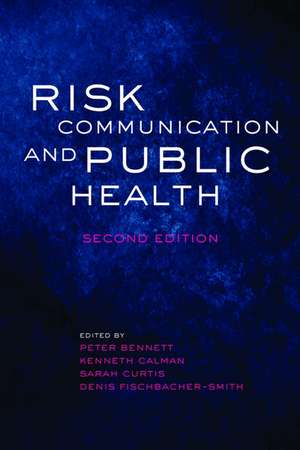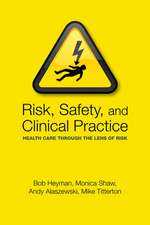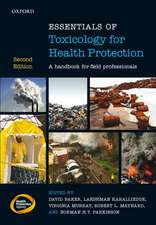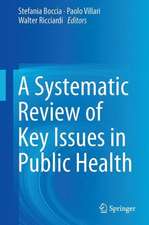Risk Communication and Public Health
Editat de Peter Bennett, Kenneth Calman, Sarah Curtis, Denis Fischbacher-Smithen Limba Engleză Paperback – 9 dec 2009
Preț: 558.94 lei
Preț vechi: 711.61 lei
-21% Nou
Puncte Express: 838
Preț estimativ în valută:
106.97€ • 116.15$ • 89.85£
106.97€ • 116.15$ • 89.85£
Carte tipărită la comandă
Livrare economică 11-17 aprilie
Preluare comenzi: 021 569.72.76
Specificații
ISBN-13: 9780199562848
ISBN-10: 0199562849
Pagini: 368
Ilustrații: 11 black and white line drawings and 4 black and white halftones
Dimensiuni: 156 x 233 x 21 mm
Greutate: 0.57 kg
Ediția:Revised
Editura: OUP OXFORD
Colecția OUP Oxford
Locul publicării:Oxford, United Kingdom
ISBN-10: 0199562849
Pagini: 368
Ilustrații: 11 black and white line drawings and 4 black and white halftones
Dimensiuni: 156 x 233 x 21 mm
Greutate: 0.57 kg
Ediția:Revised
Editura: OUP OXFORD
Colecția OUP Oxford
Locul publicării:Oxford, United Kingdom
Recenzii
Review from previous edition Anyone involved in risk communication should find this book useful. It is up to date and well referenced and indexed.
This is a risky book. It is published at a time when public interest in public health issues is probably greater than at any time before. The book is risky because it is honest: honest about the state of knowledge about risk and risk communication across a wide range of public health issues, and honest about the state of relationships between science, the public and those public institutions responsible for regulating risk. Risk Communication and Public Health should be required reading for policy makers and professionals responsible for public health... campaigners, academics and students will also find it of value. An edited collection with crisp analysis of the issues.
This book is packed with information. It has been well constructed by the editors and brings together a wide variety of perspectives from a very impressive list of authors... it is highly readable, densely packed and valuable source of reference and learning... It comes highly recommended as an addition to the bookshelf for all public health practitioners.
This is a risky book. It is published at a time when public interest in public health issues is probably greater than at any time before. The book is risky because it is honest: honest about the state of knowledge about risk and risk communication across a wide range of public health issues, and honest about the state of relationships between science, the public and those public institutions responsible for regulating risk. Risk Communication and Public Health should be required reading for policy makers and professionals responsible for public health... campaigners, academics and students will also find it of value. An edited collection with crisp analysis of the issues.
This book is packed with information. It has been well constructed by the editors and brings together a wide variety of perspectives from a very impressive list of authors... it is highly readable, densely packed and valuable source of reference and learning... It comes highly recommended as an addition to the bookshelf for all public health practitioners.
Notă biografică
Following a first degree in Physics, Peter Bennett studied the logic, history and philosophy of science, obtaining his DPhil from Sussex University. He joined the Operational Research Group at Sussex, before moving to Strathclyde University, where he became Reader in Management Science and Director of Postgraduate Studies. At the same time, he was involved in applied research and consultancy projects for clients ranging from community groups to transnational companies. He joined the Department of Health as a Principal OR Analyst in 1996, and since then has been heavily involved in analyses of risks to Public Health. He produced the Department of Health guidelines on Risk Communication. He now leads a cross-disciplinary team of analysts in the Heath Improvement and Protection Directorate of the Department, and is acting Head of Profession for Operational Research.Sir Kenneth Calman is Chancellor of the University of Glasgow. He graduated in medicine (with commendation) in 1967. He moved into the Department of Surgery in Glasgow and proceeded to the Fellowship of the Royal College of Surgeons and an MD Thesis with Honours on Organ Preservation. In 1972, he was the MRC Clinical Research Fellow at the Chester Beatty Research Institute in London and returned to Glasgow in 1974 as Professor of Oncology. He remained in that post for 10 years. In 1984 he became Dean of Postgraduate Medicine and Professor of Postgraduate Medical Education at the University of Glasgow and Consultant Physician with an interest in palliative care at Victoria Infirmary, Glasgow. He is a member of the Nuffield Council on Bioethics and President of the Institute of medical Ethics.Sarah Curtis is Professor of Health and Risk at Durham University. She has extensive international research experience in geography of health and health services, especially on inequalities of health and access to health care, health care needs assessment, health impact assessment and development of healthy public policy. Her research covers topics including: adaption of health and social care systems to changing risks of climate change (funded by EPSRC); Health Impact Assessment of urban regeneration schemes, (for Dept of Health, and other agencies); development of healthy public policy (with agencies in Canada and UK); ESRC funded research on effects of the socio-economic environment on well-being and health of adults and children; research funded by British Academy on hospital design; International research on migration, health and wellbeing supported by ESRC; comparative research on geographical variation in psychiatric service use supported by the Office of Mental Health for New York State.Denis Smith is Professor of Management at the University of Glasgow. His main research interests are in the areas of: organisational resilience, risk and crisis management; adverse events in health care; complexity and organisational performance (especially around health care organisations and the emergency services); human error and systems failure; and the role of embedded error cost in strategic change. Professor Smith's work has been concerned with issues of risk management and business continuity and this has been carried out over a 25 year period. His early work was concerned with the evacuation of urban areas due to extreme events - an interest he maintains to this day. He has also undertaken research on the training and performance of crisis management teams, the production of emergency/contingency plans (and their limitations), and the processes by which vulnerability can be generated within organisations and urban 'space'.












